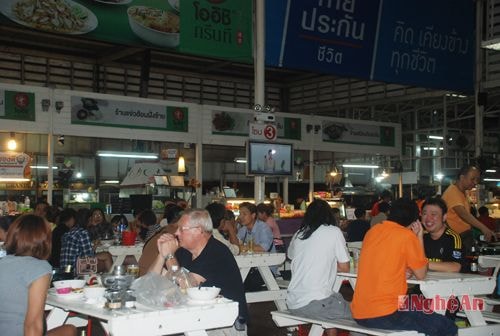Nghe An workers in Thailand - Last article: New opportunities and requirements
(Baonghean) - Thailand's implementation of a labor registration plan for Vietnamese workers in the first months of 2015 to move towards signing a labor cooperation agreement between the two countries is opening up opportunities for legalization for Vietnamese workers currently working freely in this country...
Previously, in order to promote tourism, Thailand signed a visa exemption agreement with many countries, including Vietnam, allowing citizens to enter Thailand and stay for 30 days without a visa. Because the governments of Vietnam and Thailand have not signed a labor export cooperation agreement, and no company has been licensed to operate in this field, most Vietnamese workers in general and Nghe An workers in particular working in Thailand are currently working in unofficial ways such as: going through unofficial channels, visiting relatives, through labor brokerage lines with a cost of 2-4 million VND through making tourist passports; after 30 days, they must extend their visas at border gates with Myanmar, Laos, Cambodia and Malaysia. Thus, in addition to the risks that illegal workers face, even the protection of citizens' rights and interests by the Vietnamese Embassy in Thailand is also difficult...
 |
| Nguyen Hoang Long (standing) - a Vietnamese student working part-time at the Udonthanni food court (Thailand). Photo: Thu Huong |
Based on the number of people who have extended their visas in the past 3 years (2012 - 2014), the Thai Ministry of Labor estimates that the number of illegal Vietnamese workers in the country could be up to 50,000 people. Recently, the Thai government has strengthened measures to manage foreign workers, including widespread illegal labor inspections.
For Vietnamese workers, after the two countries completed negotiations on labor cooperation, Thailand will carry out labor registration to sign a Vietnam - Thailand labor cooperation memorandum to resolve the remaining freelance labor problem and receive Vietnamese workers in the country according to the agreement.
Accordingly, Thailand will allow Vietnamese citizens who entered Thailand legally before February 10, 2015 but whose residence period has expired (more than 30 days from the date of entry), and are doing common jobs such as (housekeeping, restaurant service, bricklayer, painter, car washer, etc.) to register for a work permit with a term of 1 year. It is known that Thailand will set up foreign labor registration centers in Bangkok and 4 provinces: Chiang Mai, Rayong, Nakhonpanom and Xoongkhla. Workers who want to register need to be confirmed by their employers, declare their background and submit applications at these centers. Thailand allows these workers to continue their temporary residence until the end of February 2016.
During the above registration process, Vietnamese freelance workers who enter Thailand under the visa exemption agreement but stay to work and reside illegally without valid documents will be subject to temporary detention for verification. Workers who do not register their work within the time limit will be considered illegal by Thailand. Thailand has also informed Vietnam about the labor registration process and the Vietnamese Ministry of Foreign Affairs has sent notices to provinces with a large number of people working and residing illegally in Thailand, mainly concentrated in the Central region...
According to (incomplete) statistics of Nghe An Provincial Police, in 2014, the number of local citizens who went to Thailand to work as freelancers was 378 people. According to statistics of the Department of Labor, Invalids and Social Affairs, the number of Nghe An workers currently working as freelancers in Thailand is about 800 people, mainly from the districts of Do Luong (116 people), Con Cuong (85 people), Nghi Loc, Hung Nguyen...
However, the actual number is much larger, going back and forth freely without notifying local authorities and functional agencies. This situation causes many difficulties in grasping, managing population and managing laborers working abroad in the province; potentially complicating security and order in the area, and at the same time affecting the implementation of socio-economic development policies in the locality. From the above actual situation, on March 2, 2015, the People's Committee of Nghe An province issued Official Dispatch No. 1101/UBND.NV requesting departments, branches and localities to promptly inform people about the policy of inspecting illegal labor and implementing the registration of Vietnamese workers of the Thai Government. At the same time, propagate and mobilize people to properly implement the legal regulations on entry and exit that will be applied to Vietnamese workers working freely in Thailand; warn workers about the risks from the massive illegal labor migration to Thailand.
When we visited some localities in the province where many people work freely in Thailand, people were happy with the news that Vietnamese workers working in Thailand will be "legalized" and have their residence period extended for 1 year if they register to work with the Thai government.
However, many people are worried about their relatives working there because they do not know what Thailand's move to implement the above measures is for. Will their relatives be arrested or deported? After registering for work for 1 year, will they be allowed to continue to stay in Thailand to work?
Mr. Nguyen Van Thuan, in Nam Thinh hamlet, Nghi Thiet commune (Nghi Loc) said: In my hamlet, there are dozens of people and I myself have 2 children (1 boy, 1 girl) who are also working in Thailand. We think that if we register for work and are granted a residence extension, we will be happy, because we do not have to hide, sneak or go to another country's border gate every 30 days to extend our visa. But we are also worried that after the long extension period ends, will we be able to register to stay and make a living?
The prospect of signing a bilateral cooperation agreement between Vietnam and Thailand will help the Thai market increase transparency and competitiveness, while opening up new opportunities for Vietnamese workers to soon work legally in Thailand, thereby enjoying legitimate benefits related to salary, working conditions and insurance regimes... In fact, the job opportunities for Vietnamese people in general, and Nghe An and Ha Tinh people in particular, in Thailand are very large, because Thailand is a country with a high minimum wage in the ASEAN group (300 Baht/day). The Thai community of Vietnamese origin, especially in Bangkok and Northeast Thailand, is relatively stable and successful, with a need to employ relatives from within the country; travel between Vietnam and Thailand, especially between the central provinces of Vietnam and Northeast Thailand, is very convenient due to both air and road connections. Vietnam - Laos - Thailand are in the APOTC association with provinces (including Nghe An) using route 8 and route 12.
 |
| A corner of the culinary street in Udonthani |
In recent times, Nghe An has also carried out a number of cooperation activities with some provinces of Thailand in the fields of economics - trade - investment, education - training, culture, sports, tourism... However, because of not yet signed a labor cooperation agreement, and also limitations in capacity, skills and language, Vietnamese workers in general, and in the Nghe An - Ha Tinh region in particular, are still mainly manual workers, and do not have the opportunity to work in the industrial sector or export processing zones in Thailand.
Mr. Nguyen Hai Duong, Deputy Director of Nghe An Department of Foreign Affairs, said: When the two sides officially sign a labor cooperation agreement, the opening of the Thai labor market will truly be an opportunity for Nghe An workers. However, to take advantage of the advantages and promote the labor export market to Thailand, the most important thing is still vocational training, language training, skills training and professional working style so that workers have the opportunity to access technical jobs, with good income and high stability.
In the immediate future, while waiting for the Governments of the two countries to promote the process of labor cooperation, functional sectors and localities in the province need to strengthen propaganda work for people and workers to grasp the provisions of state law on sending Vietnamese workers to work for a limited period of time abroad in general, Thailand in particular, and the difficulties, risks, and negative consequences of the form of freelance labor and illegal residence abroad. From there, mobilize freelance workers to register with the host government to complete residence paperwork procedures so that they can work with peace of mind and have their legitimate rights protected. Resolutely handle organizations and individuals that entice migrants to work and reside illegally abroad, complicating the security and order situation at home and abroad. Strengthen management of temporary absence, temporary residence, and permanent residence; guide, direct, and inspect the implementation of legal provisions on residence management in localities. Tighten border and gate inspection and control combined with visa approval and issuance. And importantly, workers themselves need to be aware of respecting local laws during the entry and residence process. After all, workers also represent the image and reputation of a country, a locality...
Khanh Ly - My Ha
| RELATED NEWS |
|---|
| Since April 2015, the Ministry of Public Health of Thailand has allowed workers from 4 countries: Vietnam, Myanmar, Laos, Cambodia working in Thailand and their eligible dependents to buy health insurance like Thai people. With this type of insurance, workers will be paid for medical examination and treatment of chronic diseases, surgery and even expensive antiretroviral drugs. |






